Full Stack Development Internship Program
- 29k Enrolled Learners
- Weekend/Weekday
- Live Class
If you know a lot about computers or are just starting, you have probably come across Full Stack Developer and Software Engineer roles.
At first look, they may appear extremely similar. Of course, they aren’t synonymous. But what separates them? More importantly, which one do your goals better align with?
In this blog on Full Stack Developers vs Software Engineers, we’ll look at their main differences. While both positions need programming, their focus areas differ. Full Stack Developers oversee both front-end and back-end development, spanning the user experience and server-side functionality.
Software Engineers, on the other hand, specialize in building and developing comprehensive systems, with an emphasis on architectural and engineering concepts.
A Full Stack Developer is a multi-talented individual who can work on web applications’ front and back ends. A software engineer, on the other hand, may not work on both ends of the application, but rather specialize in specific fields.
They have experience with a wide range of programming languages and technologies, as well as the complete stack. This explains the “breadth” of their abilities.
On the other hand, a Software Engineer focuses on specific areas of development, such as system design, algorithms, or a programming language. This is the”depth” of their skill.
Now that we know the roles, let’s take a look at their responsibilities.
As previously stated, a Full Stack Developer works on all parts of the development project. This is also reflected in their extensive range of responsibilities.
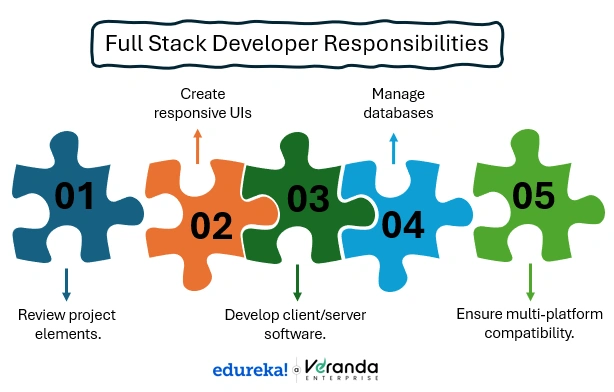
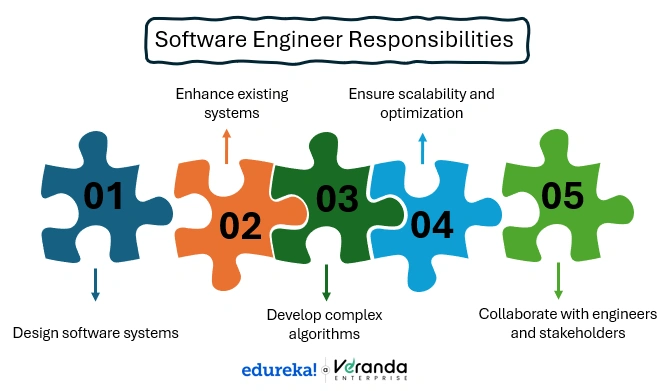 3. The Skills
3. The SkillsWhen it comes to skills, both roles have distinct requirements.
Full Stack Developer:
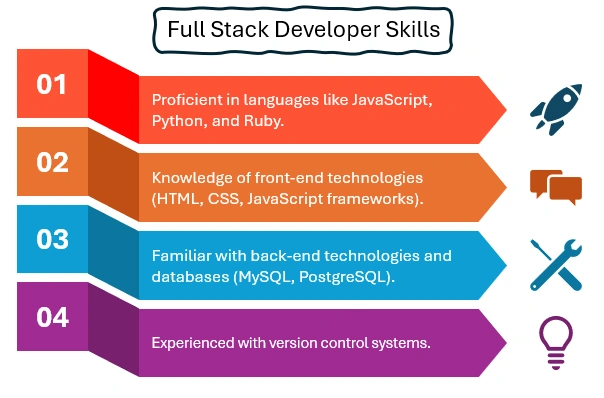
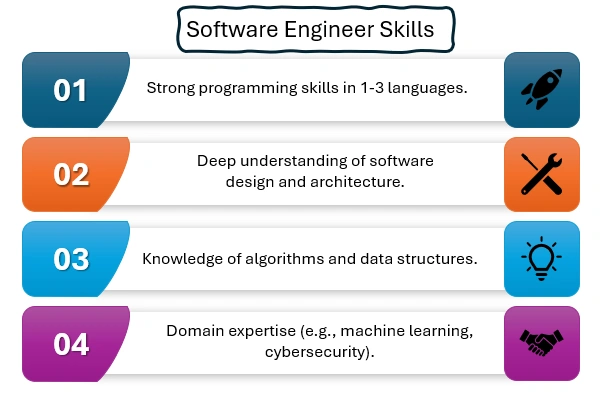 4. The Education
4. The Education| Criteria | Full-Stack Developer (FSD) | Software Engineer (SE) |
| Required Degree | Helpful but not mandatory; a degree in Computer Science, IT, or related fields. | A bachelor’s or master’s in Computer Science, Software Engineering, or related fields is typically required. |
| Alternative Education | Self-taught, boot camps, online courses, or certifications. | Advanced degrees or certifications may be required for specialized roles. |
| Importance of Formal Education | Practical experience and a strong portfolio often outweigh formal degrees. | Formal education is generally prioritized over self-taught skills. |
As we look to the future, both jobs will need to adapt to new technologies.
Both of these occupations will demand you to adapt to new and developing technologies. Examples include artificial intelligence (AI), machine learning, and cloud computing.
As online applications get more complicated, Full Stack Developers will most likely need to adapt to new frameworks. We might see increased specialization in Full Stack Development.
Aside from the domains mentioned above, the increasing relevance of cybersecurity and big data will produce (and is already creating) new possibilities for software engineers. The United States Bureau of Labor Statistics predicts a 22% increase in software developer jobs from 2019 to 2029, which is substantially faster than the average for many other occupations.
| Aspect | Full-Stack Developer | Software Engineer |
| Average Salary (US) | Up to $120,000 annually ($57.69/hour); experienced professionals earn up to $155,000. | Averages $115,000 per year, higher for specialized or senior roles. |
| Average Salary (India) | ₹9,00,000 per year (as per Indeed). | ₹7,00,000 per year (as per Glassdoor). |
| Factors Affecting Salary | Depends on region, experience, and company; competitive in startups. | Big tech companies offer higher compensation based on region and experience. |
| Potential for Growth | Significant salary increase with experience and specialization. | Significant salary increase with experience and specialization. |
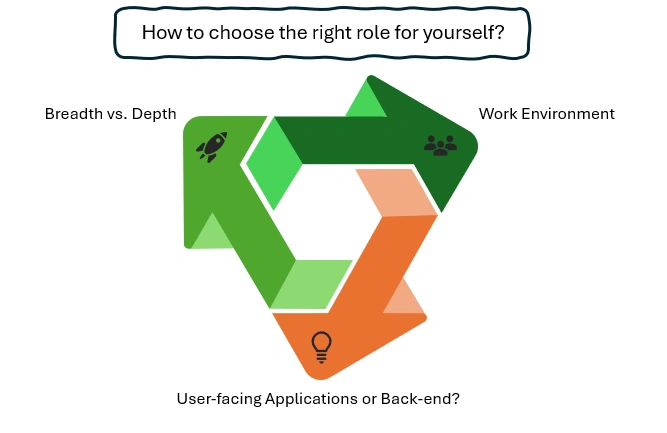 1. Breadth vs. Depth
1. Breadth vs. DepthDo you prefer a diverse profile to manage all areas of a project? Or do you prefer specialization, focusing on a few elements?
Consider Full Stack Development if you appreciate having a diverse profile. You’ll get to work on many areas of web apps and use a variety of technologies to solve different problems.
On the other hand, if you desire complexity but fewer aspects, software engineering may be a better fit. It will frequently require working on larger, more complicated systems, which may or may not be web-based.
Consider the type of applications you enjoy working on. Do you like the front or back end of applications?
Full Stack developers focus on the product’s user interface, whereas software engineers are more likely to work on the back end. The latter requires more emphasis on the basic operation of the programs.
On the other hand, will have the opportunity to work on interfaces with which the user interacts directly. As a result, their work has an instant influence on the user experience.
Think about your ideal work environment. Do you enjoy a fast-paced, flexible working environment? Or do you like to focus on a few components with specializations?
Some people prefer working in a fast-paced setting with various duties. Start-ups and small businesses can provide such a dynamic atmosphere. If it appeals to you, explore Full Stack Development.
If none of the above draws your interest, software engineering may be a better fit for your working style. It will help you to focus on specific topics in a structured atmosphere. They are typically found in larger, more established companies, working on larger-scale projects.
Full Stack Developer Roadmap 2025
In conclusion, each function has its distinct features, Both Full Stack Developers and Software Engineers serve critical roles in the tech ecosystem. While Full Stack Developers can handle comprehensive development, a software engineer specializes in building scalable and efficient systems. Choose as per your abilities, interests, or career objectives.
So, if you’re here ready to set the ball rolling in Full Stack Development and learn front-end to back-end and everything in between,Full Stack Developer Course is for you to explore. It is designed to skill and train the aspirant hands-on to carve out a place in this exciting and high-demand field. Pick it up today!
The essential difference lies in the fact that a software developer engages in making software applications, which may focus on either the front end, the back end, or other specialized fields, whereas a Full Stack Developer works on both the front end and the back end of web applications, handling the entire stack.
yes, he/she can perform the duties of a software developer. However, they may not have the in-depth knowledge that specialists have, such as advanced UI design, back-end engineering, or working with specific designs and technologies.
It depends on your objectives. If you wish to use a wide range of tools, then starting off as a Full Stack Developer gives you flexibility, but if you want to acquire knowledge in depth for niche positions, then it is better to specialize.
 Thank you for registering Join Edureka Meetup community for 100+ Free Webinars each month JOIN MEETUP GROUP
Thank you for registering Join Edureka Meetup community for 100+ Free Webinars each month JOIN MEETUP GROUPedureka.co